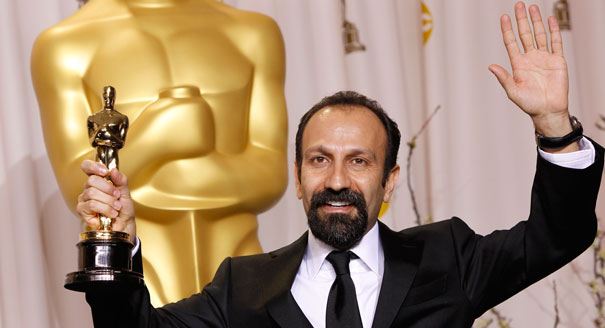UPDATES
Iran claims victory over Israel in Academy Awards while continuing to repress film industry
February 28, 2012 | Daniel Meyerowitz-Katz

When accepting the Academy Award for Best Foreign Language Film last night, for his film Separation, Iranian filmmaker Asghar Farhadi took a veiled stab at the regime ruling Iran. Farhadi expressed how grateful he was that Iran was being recognised for its “glorious culture” and spoke of the Iranian people’s rejection of “hostility and resentment”.
At this time, many Iranians all over the world are watching us and I imagine them to be very happy. They are happy not just because of an important award or a film or filmmaker, but because at the time when talk of war, intimidation and aggression is exchanged between politicians, the name of their country Iran is spoken here through her glorious culture. A rich and ancient culture that has been hidden under the heavy dust of politics. I proudly offer this award to the people of my country. A people who respect all cultures and civilizations and despise hostility and resentment.
Alyssa Rosenberg elaborates on the victory speech, noting a number of other subtle digs at Iran’s ruling Ayatollahs, as well as the potential risk to Farhadi that could result from this.
One of the best things art can do is expose who we are, in all our beauty and ugliness, and remind us of what we’re capable of being. And in this case, it was also a brave act. Farhadi’s been wearing a necktie most of this awards season in a subtle rebuke to the Iranian regime’s suggestion that it’s a decadent Western accessory, and tonight, some commentators suggest that his speech could prevent him from returning to Iran or make life uncomfortable for him when he got back there. That’s a real risk for an award that carries less benefit than a Best Actor or Best Director statuette. Farhadi should be an example to politically engaged artists-and to politicians-everywhere.
In Iran itself, the reaction to the award has revealed the deep contradictions that run through the society. As this AP report illustrates, the regime has tried to spin the fact that Separation won over the Israeli movie Footnote as a victory over Israel:
Iran’s state-spun praise for “A Separation,” which beat out an Israeli film and three others in the foreign language category, was mostly wrapped in patriotic boasting as a conquest for Iranian culture and a blow for Israel’s perceived outsized influence in America … A state TV broadcast said the award succeeded in “leaving behind” a film from Israel. Javad Shamaghdari, head of the state Cinematic Agency, portrayed the Oscar win as the “beginning of the collapse” of Israeli influence that “beats the drum of war” in the U.S. and elsewhere.
Meanwhile, as revealed by the AFP, not only did the Iranian regime not allow the Oscars to be screened on Iranian television, the claim of “victory” is hollow given the general repression that the Iranian movie industry suffers. It would be apt to say that Separation succeeded in spite of, not because of, Iran’s rulers.
Last month, Farhadi proposed that Iranian authorities allow a vote among artists about the fate of the House of Cinema, an independent film group that operated for 20 years before it was ordered closed by authorities in January.
Officials said it lacked the proper permits. Artists and others claimed it was a political decision because the group often took liberal stands contrary to government’s cultural policies.
Iranian cinema has for years been one of the nation’s main cultural exports, notably films of Abbas Kiarostami, Majid Majidi and Jafar Panahi. Panahi in 2011 was sentenced to a six-year house arrest and a 20-year ban on filmmaking after being convicted of “making propaganda” against Iran’s ruling system.
Daniel Meyerowitz-Katz
Tags: Iran





